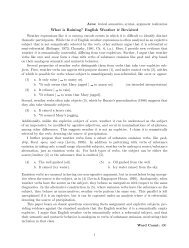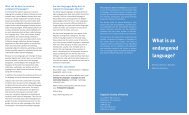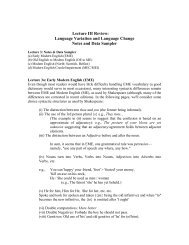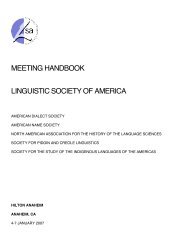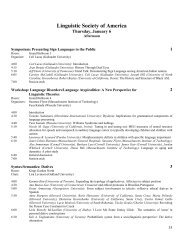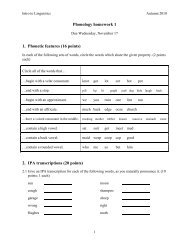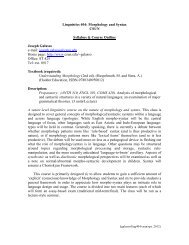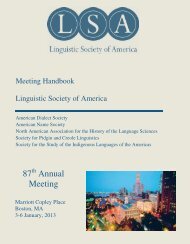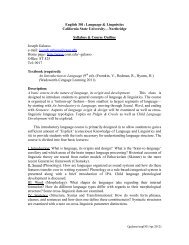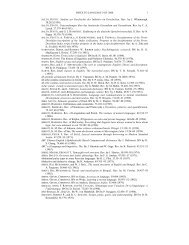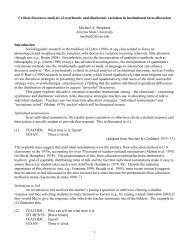here - Linguistic Society of America
here - Linguistic Society of America
here - Linguistic Society of America
Create successful ePaper yourself
Turn your PDF publications into a flip-book with our unique Google optimized e-Paper software.
Mary Byram Washburn (University <strong>of</strong> Southern California) Session 34Elsi Kaiser (University <strong>of</strong> Southern California)Maria Luisa Zubizarreta (University <strong>of</strong> Southern California)The English it-cleft: no need to get exhaustedEnglish it-clefts are thought to be exhaustive, e.g. in “It was [John] who left,” John is the only person who left. However, weconducted a grammaticality-judgment experiment showing that it-clefts do not have to be exhaustive. Participants read foursentencecontexts, heard an it-cleft, and then rated the naturalness <strong>of</strong> this it-cleft. We manipulated the context to test whet<strong>here</strong>xhaustiveness and/or contrast influence how people rate it-clefts’ naturalness. Nonexhaustive it-clefts were rated more naturalthan non-contrastive, but not significantly different from exhaustive it-clefts. These findings contradict claims that it-clefts arein<strong>here</strong>ntly/semantically exhaustive, but are explainable if exhaustivity is a conversational implicature.James Watters (SIL International) Session 101Structure-changing and structure-preferring Spanish influence on TepehuaExamples are presented <strong>of</strong> language change from contact with Spanish in two Tepehua (Totonacan) languages: structurepreservingborrowing, structure-change in the phonology, and structure-preferring influences. The focus is on the last two types <strong>of</strong>change. Changes in the phonology include replacement <strong>of</strong> uvulars by /ʔ/; change from a three-vowel to a five-vowel system; loss<strong>of</strong> contrast between /l/ and /ɬ/; and the increased salience <strong>of</strong> the allophonic distinction between [β] and [w]. Contact has alsoapparently led to the preference <strong>of</strong> certain structures, including the use <strong>of</strong> the indefinite article and the periphrastic form <strong>of</strong> theprogressive.Dibella Wdzenczny (University <strong>of</strong> California, Santa Barbara) Session 34Syntax and frequency: the shaping <strong>of</strong> initial consonant mutationInitial Consonant Mutation (ICM) is a well-known characteristic <strong>of</strong> the Celtic languages. The relationship between the ICMtrigger and its target has been analyzed as a dependent-head or head-complement relationship but t<strong>here</strong> has been no crosslinguisticexamination <strong>of</strong> the syntactic environments in which ICM appears. Three other languages from very different geographicregions display the same type <strong>of</strong> ICM: Nivkh, a Siberian isolate, Mundurukú, a Tupían language, and Nias Selatan, anAustronesian language. If we construct a typology, patterns emerge that can lead towards a further diachronic explanation.Kodi Weatherholtz (The Ohio State University) Session 49Is F1 different from F2? Generalization in lexically driven perceptual adaptationTwo experiments investigate whether perceptual adaptation to novel vowel productions is specific to or generalizes beyond theexperienced input. Results from Experiment 1 indicate that adaptation to a front vowel lowered accent generalizes to t<strong>here</strong>cognition <strong>of</strong> words produced with raised but not backed realizations <strong>of</strong> front vowels. Experiment 2 (in progress) tests competingexplanations about why adaptation generalized to shifts in vowel height but not in vowel backness. Listeners experienced a backvowel lowered accent and were then tested on recognition <strong>of</strong> words produced with raised and fronted realizations <strong>of</strong> back vowels.Andrew Weir (University <strong>of</strong> Massachusetts Amherst) Session 17Article drop in headlines: failure <strong>of</strong> CP-level AgreeArticles in English headlines can be dropped, but the process is grammatically constrained: for example, Man bites a dog ispossible while *A man bites dog is not. Furthermore, bare NPs in 'headlinese' appear to have obligatory wide scope. I propose thatheadlinese contains an article which is dependent for spellout on a high existential operator Agreeing with it, and that material inthe CP layer cannot Agree in headlinese. If an existential operator is in CP, NPs in the headline will be article-less, and have widescope; if in vP, object NPs can bear articles and take low scope.Nicholas Welch (University <strong>of</strong> Toronto) Session 93Propping up predicates: BE-support in Tlicho YatiiNicholas Welch (University <strong>of</strong> Toronto) Session 41The bearable lightness <strong>of</strong> beingTłı̨chǫYatıì (aka Dogrib: Athapaskan) has two copulas that yield differing interpretations, corresponding roughly to the stage-/individual-level predicate distinction (SLP/ILP). Representing this distribution syntactically is challenging, as copulas are215



